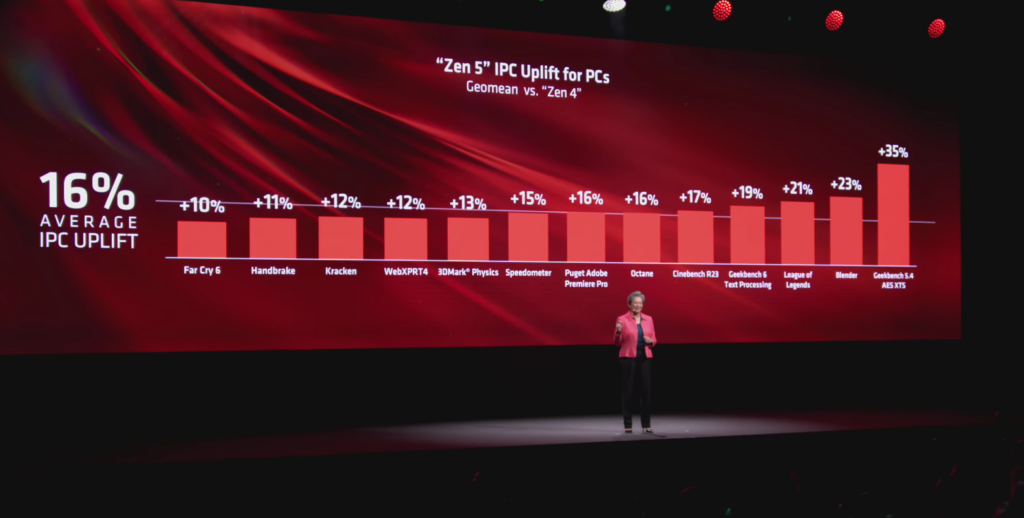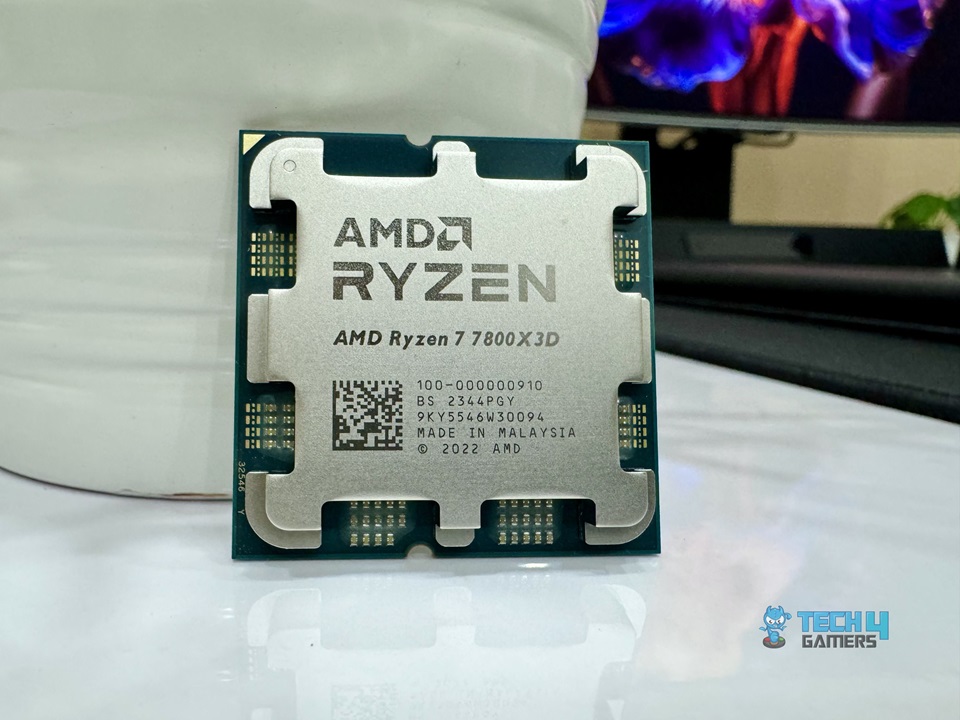- Zen 5 offers a 16% IPC improvement over Zen 4, with notable gains in applications like Blender.
- Zen 5 mobile CPUs feature dedicated NPUs, providing significant AI processing power and efficiency.
- Not a must-buy if you have upgraded recently.
It wasn’t long ago when AMD launched Zen 4 and transitioned to LGA circuits, but now the release of Zen 5 is almost here. AMD announced some time ago that Zen 5 will be available in July, and the anticipation is building. Everyone eagerly awaits its release, but the big question is: Is it a worthwhile investment of your money? Let’s take a closer look.
Significant Performance Boost
AMD claims a 16% performance increase over Zen 4 regarding instructions per clock cycle (IPC), with Ryzen 9 9950X delivering the fastest consumer desktop performance globally. Seeing as the speeds in Megahertz are like what we got with the Ryzen 7000, that should hopefully translate to a somewhat comparable average performance increase. However, this will depend heavily on the application, with Blender being the program that benefited the most, according to the stats provided by AMD itself.

It’s worth mentioning here that AMD itself stated that the IPC improvements are primarily due to better branch prediction, which is pretty standard for a new generation of CPU.
Higher RAM Speed And Faster Motherboards
Zen 5 has official support for high memory speeds. This means you can now set your speeds up to DDR5 5600 while remaining within warranty. This is an upgrade from the 5200 memory speed supported by Zen 4.
A new CPU architecture also means new and faster chipsets. So far, AMD has announced the X870E and X870 chips. Both chips differ quite a lot in terms of their specifications, and the main difference is probably in terms of the usable PCI express lanes, with X870E offering more usable PCI lanes than X870.
Another thing to remember about this new set of motherboards is their support for the latest USB standard. USB 4 support is standard for both chipsets, as is support for Wi-Fi 7.
What Does Zen 5 Actually Offer?
The launch lineup will be fairly similar to what we have seen in the past. There will be two nine-series models, one seven-series, and one five-series model. The core counts are also similar to those offered in Zen 4. Personally, I feel like there should have been an increase in core counts and threads with this new generation of CPU to convince me to upgrade.
| Model | Cores/Threads | Boost/Base Frequency | Total Cache | PCIe | TDP |
| AMD Ryzen 9 9950X | 16/32 | Up to 5.7 GHz/ 4.3 GHz | 80MB | Gen 5 | 170W |
| AMD Ryzen 9 9900X | 12/24 | Up to 5.6 GHz/ 4.4 GHz | 76MB
|
Gen 5 | 120W |
| AMD Ryzen 7 9700X | 8/16 | Up to 5.5 GHz/ 3.8 GHz | 40MB | Gen 5 | 65W |
| AMD Ryzen 5 9600X | 6/12 | Up to 5.4 GHz/ 3.9 GHz | 38MB | Gen 5 | 65W |
One thing that most of you, including myself, would like is that apart from the very top-end 9950X, the TDPs (thermal design power) offered by the rest of the modules are quite low. This makes sense, considering that Zen 5 is on a smaller process node than Zen 4.
Introduction of Ryzen AI 300 Series Processors
The first couple of Zen 5 mobile CPUs will have a different branding than in the past, as they will be called Ryzen AI. Yes, you guessed it right, these CPUs are going to have a dedicated Neural processing unit (NPU) and I believe that’s primarily to compete with Qualcomm’s Snapdragon X chips as well as the Intel chips that will also feature AI processors.
These Ryzen AI CPUs will support up to 50 TOPS (trillion operations per second), which makes them more than three times as powerful as the NPUs we got with the Ryzen 8000 series. These NPUs are more than strong enough to support the Windows Co-pilot Plus feature, including the controversial AI Recall feature, assuming, of course, Microsoft actually releases it at some point (pun intended).
Worth It?

Do I recommend buying a Zen 5 chip or a laptop with one included this summer when they come out in the market? Well, you do get a nice little performance bump, but seeing as the last Zen 4 already had optional support for newer standards like PCI Express 5.0 and USB 4.0, I personally don’t think they are an absolute must-buy if you have already upgraded recently.
The general attitude towards AI seems rather negative, especially considering there isn’t yet a compelling use case for local NPUs on desktops or laptops, which means you don’t need an AI PC just yet. However, if you want Microsoft’s AI features on a traditional X86 system, then have at it, as laptops save power running AI tasks on NPUs.
While AMD has somewhat ridden the wave of AI excitement and may continue to do so, I am not sure if they can close the gap against NVIDIA. For now, we wait to see whether Zen 5 will meet AMD’s claimed performance boosts.
Thank you! Please share your positive feedback. 🔋
How could we improve this post? Please Help us. 😔


 Threads
Threads

